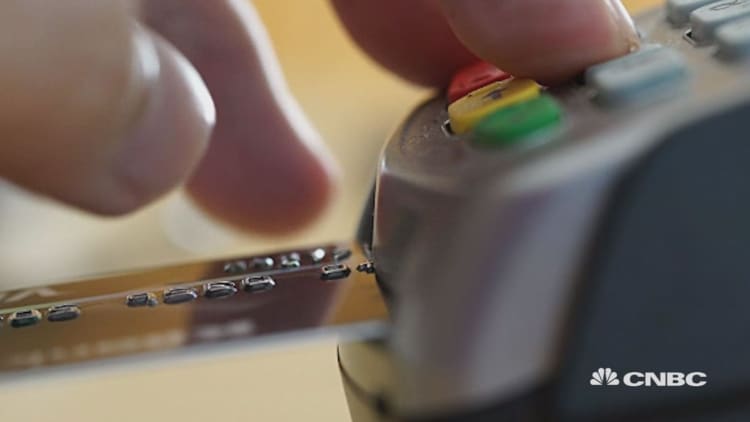
As we move farther and farther down the road toward a cashless society, consumers can use credit cards to pay for nearly everything, everywhere these days. But just because you can doesn't mean you necessarily should, warns credit reporting agency Experian.
Outstanding card debt has now hit its highest point ever, surpassing $1 trillion in 2017, according to the Federal Reserve. And 86 percent of Americans who have or had credit card debt said they regret it, according to a recent report by NerdWallet.
More from Advisor Insight:
The bad things people do with 401(k) plans
What sort of insurance do you need?
Most consumers confused about credit, debt
Here are six expenses Experian advises you to not put on plastic.
1. Taxes. If you get slammed with an unexpected tax bill this April, it could be tempting to pay Uncle Sam via Visa or Mastercard. Not so fast: The Internal Revenue Service will charge a merchant processing fee of anywhere of up to 2 percent and, if you use third-party filing software, you'll pay even more. And why pay interest charges of taxes owed? Instead, consider a short-term personal loan or ask the IRS for a payment plan; the government interest rate is usually only around 0.5 percent, according to Experian.
2. College tuition. This is one for the books: Don't ever pay for education with credit, as the interest on student loans is nearly always lower. In addition, large charges such as tuition fees will up your credit utilization ratio, which can result in a ding to your credit score. What's more, colleges and universities often add a processing fee of up to 3 percent for card payments.
3. Mortgage payments. Most home-loan lenders won't let you pay your mortgage by credit card but there are plenty of third parties who will gladly help with that — for a huge fee, of course, says Experian. And if you don't pay off your credit card balance at the end of the month, you'll compound your mortage debt and eat up a lot of your available credit — again impacting credit scores.
4. Big-ticket items you can't really afford. Here's rule No. 1 for credit card buys: If you can't pay it off in full by the end of the month, don't put it on plastic. Only open a new account offering a 0 percent introductory rate for a set period to pay for such a purchase after you figure out how many months it will take you to pay if off at zero interest and set up those automatic payments. And remember, the hard inquiry to open the new account will impact your credit score.
5. Medical bills. Health-care costs are soaring and show no signs of slowing down. But if you need treatment you cannot actually afford, there are options other than credit cards for paying off balances. Many medical providers will offer low- or no-interest payment plans, or will negotiate lower bills altogether, notes Experian.
6. Stocks and other investments. It's not only difficult to buy investments such as stocks with credit cards, it's also a bad idea because there are such high risks involved. By way of example, Marketwatch recently reported on one Canadian financial analyst who gambled this way and lost big, notes Experian.





